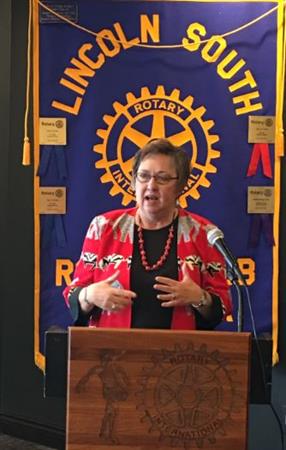We had an interesting program from Clare Nelson at Lincoln South Rotary Club on June 21. She shared information and stories about the Mediation Center - their tag line is "Where solutions are discovered".
Clare Nelson is the Restorative Practices Coordinator at The Mediation Center. She is the first point of contact for anyone looking to them for services.
Mediation is a non-adversarial process for resolving disputes. At The Mediation Center in Lincoln there are co-mediators who assist participants to focus on the real issues of the dispute, clarify misunderstandings, explore solutions, and negotiation a settlement.
Almost any kind of dispute can be mediated if both parties agree to discuss the issues. Some kinds of issues they have mediated - divorce, parenting plans, educational concerns, family issues, landlord/tenant disputes, organizational conflicts and victim/offender dialogue.
Clare pointed out that a very good example of and issue that can be successfully mediated is parents who are divorcing and want to discuss a parenting plan for the children. By asking questions and listening to each person's stories and concerns, the mediator can help guide the discussion with a focus on the children.
Clare spent time talking about the restorative process and restorative justice. The restorative process can be from formal to informal and can help in matters that are minor to criminal.
She shared the processes to help in situations with students. Using the restorative process they can often find a solution and avoid suspension from school. Understanding that if a student is away from school, they get behind in their studies and the drop-out rate is high. She has The process acknowledges the facts as perceived by both parties and provides for an expression of feelings. It can promote healing for the victim and the offender and provide closure for all people affected by the offense.
Some of the statistics (from the 17-18 year)...in Nebraska:
- 94% of youth going through the program came to an agreement for reparations
- 98% of those reparations were completed and 2% were in process
- 4 out of 5 of the youth in the program did not repeat offenses
- 100% of the participants stated that they were satisfied or highly satisfied with a post process survey
